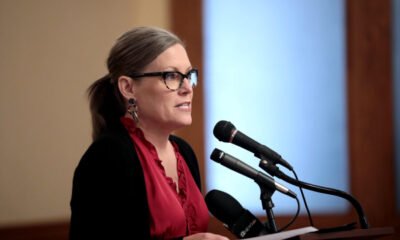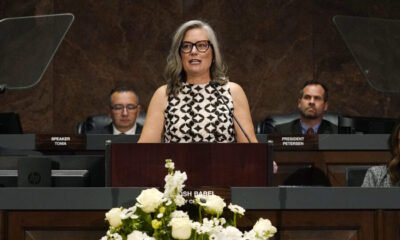aps
Hobbs Pens Controversial Utility Financing Bill; Opponents Signal Potential Legal Battle

Governor Katie Hobbs has signed a contentious utility financing bill into law, drawing criticism from environmental advocates and some legislators. The bill, known as House Bill 2679, allows utility companies to convert debt into low-interest bonds, enabling them to recover funds for outdated or inefficient assets.
Written by Arizona Public Service (APS), the proposed legislation was sponsored by Republican Representative Gail Griffin. Its passage has sparked significant opposition, including from current and former members of the Arizona Corporation Commission (ACC), Attorney General Kris Mayes, and Senate Minority Leader Priya Sundareshan.
Upon signing the bill on May 13, Hobbs emphasized her collaboration with a bipartisan group to refine the measure, which she described as a “common sense, middle of the road solution.” She stated that the bill aims to lower costs for Arizonans and enhance energy grid resilience, while also ensuring accountability from utility companies.
Initially proposed in January, the bill faced swift backlash. The all-Republican ACC expressed frustration over not being consulted during its drafting. By March, the commission took a neutral stance, citing the lack of involvement prior to its introduction.
Opposition intensified when former ACC Chairman Bob Burns suggested postponing the bill for an evidentiary hearing. In April, AG Mayes flagged potential constitutional conflicts, asserting that the bill could infringe upon the ACC’s authority to regulate utility rates.
Despite these concerns, lawmakers moved forward, making amendments aimed at addressing some objections. However, critics argue that these changes still do not sufficiently regulate the securitization process or prevent the inclusion of operational coal plants in the transfer.
Among the amendments, provisions were added to limit securitization to utility infrastructure active at the time of the bill’s passage and to eliminate the ability to securitize unrecovered fuel costs. Sundareshan expressed disappointment over the hurried legislative process, citing concerns raised by her constituents that were seemingly overlooked.
Mayes’s office reiterated concerns regarding the bill’s constitutionality, particularly how future commissions could be hindered in their regulatory duties following ACC approval of bond terms. Opponents of HB2679 are contemplating potential legal challenges or seeking formal legal opinions on its implications.
The signing follows revelations that Pinnacle West, APS’s parent company, contributed significantly to Hobbs’ election and inauguration funds, raising questions about the relationship between the utility and the administration.
On a positive note, the Arizona Chamber of Commerce and Industry hailed the bill as beneficial for Arizona ratepayers. Griffin, the bill’s sponsor, acknowledged that innovative financing tools would help utilities manage increasing demand while lowering costs for consumers.




![Members of the Arizona House of Representatives vote during a third reading of nearly three dozen bills at the Arizona State Capitol on March 4, 2025. [Monica D. Spencer]](https://arizonanews.org/wp-content/uploads/2025/06/SR-347-Secures-53M-in-Third-State-Budget-Draft-Awaiting-400x240.jpg)
![Members of the Arizona House of Representatives vote during a third reading of nearly three dozen bills at the Arizona State Capitol on March 4, 2025. [Monica D. Spencer]](https://arizonanews.org/wp-content/uploads/2025/06/SR-347-Secures-53M-in-Third-State-Budget-Draft-Awaiting-80x80.jpg)












